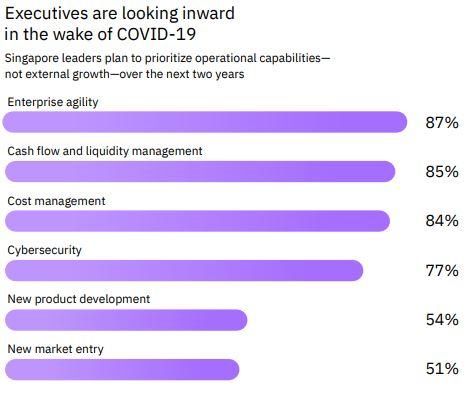share on
The COVID-19 pandemic has brought about many changes to businesses around the world, one of which is the acceleration of digital transformations.
A new IBM study of global C-suite executives, titled "COVID-19 and the Future of Business in Singapore," found that six in ten organisations have accelerated their digital transformations due to the COVID-19 pandemic.
In fact, 66% of executives said they have completed initiatives that previously encountered resistance, as traditional and perceived barriers to technology adoption - such as technology immaturity and employee opposition to change - fall away.
The study also revealed three proactive steps leaders are taking to ensure their businesses survive and thrive as we emerge into a post-COVID environment.
#1 Improving operational scalability and flexibility
The ongoing disruption of the COVID-19 pandemic has highlighted the importance for businesses to be built for change.
In line with that, the study revealed that the majority of organisations are making permanent changes to their organisational strategy. For instance, 95% of Singapore executives surveyed plan to participate in platform-based business models by 2022, and many reported they will increase participation in ecosystems and partner networks.
Executives are also looking towards more scalable and flexible IT infrastructure. Many have indicated they are increasing their investments in innovative technologies such as AI and IoT, as well as the cloud and blockchain to assist with the new demands on the IT infrastructure.
At the same time, the survey found that C-suite leaders have become more trusting of what technology can do and are pushing ahead with digital transformation.

#2 Applying AI, automation and other exponential technologies to help make workflows more intelligent
With COVID-19 having disrupted critical workflows and processes at the heart of many organisations' core operations, technologies (such as AI, automation and cybersecurity) that could help make workflows more intelligent, responsive and secure are increasing in priority across the board for responding global executives.
In that line, the report found that over the next two years:
- 77% of Singapore executives said they are increasing their cybersecurity commitments in line with increasing concerns, with 42% planning to use AI to enhance their cybersecurity simultaneously.
- 87% plan to focus on enterprise agility, which is the most important issue for Singapore leaders.
- Simultaneously, as companies look more inwards the management of cost is a key topic for Singapore executives/
- Coincidentally, reducing costs is cited as the top benefit attributed to transformation initiatives.
As executives increasingly invest in cloud, AI, automation and other exponential technologies, IBM recommended leaders should keep in mind the users of that technology – their people. These digital tools should enable a positive employee experience by design, and support people's innovation and productivity.

#3 Leading, engaging and enabling the workforce in new ways
Further, the study found a disconnect between employers and employees, particularly around what employers are offering versus what employees consider a priority.
Businesses surveyed are seeing more clearly the critical role people play in driving their ongoing transformation. Executives contend that employee well-being is among their highest priorities. Despite this, only about half of employees say they believe that their employer is genuinely concerned about their welfare. Workforce safety, skills, and flexibility have taken precedence while employee satisfaction has been severely deprioritised.
To address this gap, IBM recommended that executives place deeper focus on their people, putting employees' end-to-end well-being first. Empathetic leaders who encourage personal accountability and support employees to work in self-directed squads that apply design thinking, agile principles and DevOps tools and techniques can be beneficial.
Organisations should also think about adopting a holistic, multi-modal model of skills development to help employees develop both the behavioural and technical skills required to work in the new normal and foster a culture of continuous learning.
Photo / 123RF
Human Resources Online is on Telegram! Follow us @humanresourcesonline or click here for all the latest weekly HR and manpower news from around the region.
share on
Follow us on Telegram and on Instagram @humanresourcesonline for all the latest HR and manpower news from around the region!
Related topics


